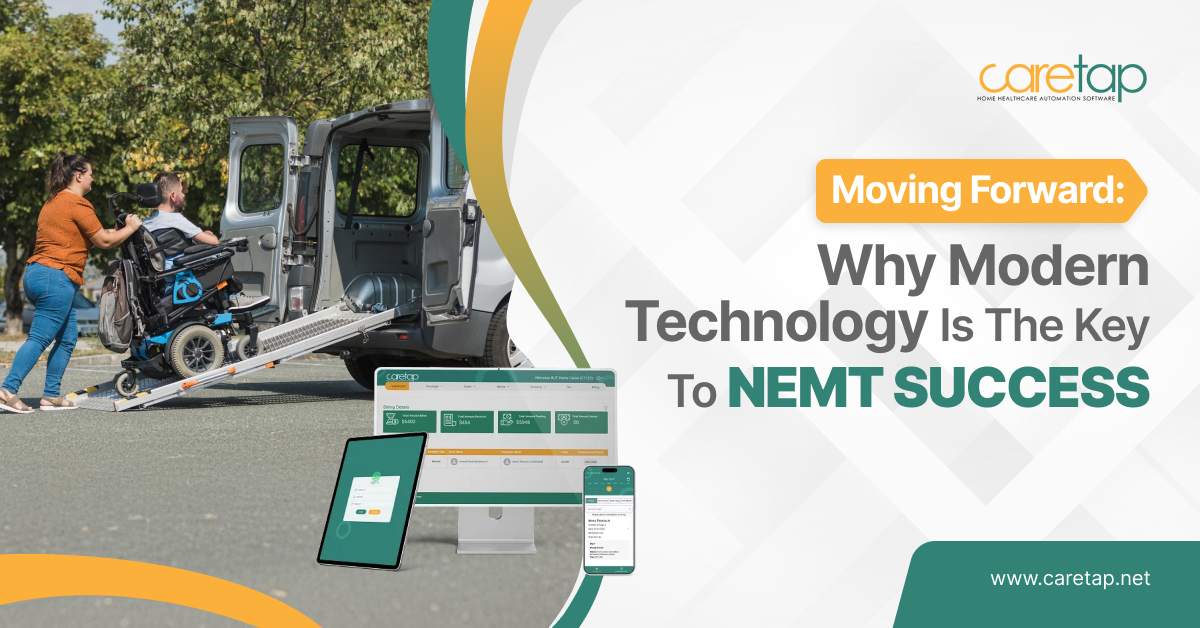A 2025 case: The Michigan Attorney General indicted a Macomb County woman for using a GPS-spoofing app to bill Medicaid for trips that never occurred. She’s charged with felony Medicaid fraud and conspiracy
States like New York and Ohio have seen companies billed or fined, settlements (OH: billing irregularities) for false Medicaid transport claims
This is just few examples of how NEMT fraud can cripple a business overnight. Fraudulent claims, manipulated logs, and non-compliance are no longer rare—they’re becoming common headaches in an industry built on trust, care, and service.
As the demand for NEMT services continues to grow with aging populations and increased Medicaid enrollments, so does the need to protect the system from abuse. This blog explores the various aspects of NEMT fraud, its consequences, and how the strategic use of modern technology, such as Caretap’s NEMT Software, is helping companies remain compliant, efficient, and secure.
Understanding NEMT Fraud and Abuse
Fraud in the NEMT space refers to intentional deception or misrepresentation resulting in unauthorized benefits—often financial. Abuse, on the other hand, might not be deliberate but still results in unnecessary costs to Medicaid and commercial insurers.
Common Forms of NEMT Fraud:
- Billing for rides not provided
- Submitting duplicate claims
- Falsifying trip logs or GPS data
- Unauthorized or medically unnecessary rides
- Kickbacks for transporting patients to specific providers
While some may blur the line between mistake and misconduct, the difference matters in court. Fraud is criminal. Abuse may be administrative—but both can result in the loss of your license, money, and business.
The Consequences of NEMT Fraud
The risks of NEMT fraud go far beyond financial penalties.
Legal Consequences:
- Hefty civil fines and even criminal charges
- Loss of Medicaid eligibility and provider license
- Permanent reputation damage with healthcare authorities
Operational Fallout:
- Increased audits and scrutiny from payers
- Drained revenue from recoupments and payment holds
- Staff turnover due to pressure and fear of repercussions
Reputation Damage:
Fraud doesn’t just hurt the guilty—it casts a shadow over the entire industry. Healthcare organizations, patients, and communities lose trust, and those who genuinely care suffer the most.
Red Flags That Indicate Potential Fraud

Knowing the early warning signs can help agencies take quick action before minor issues spiral into federal investigations.
Look out for:
- Inconsistent trip documentation or mileage logs
- A spike in ride frequency for the same patient
- Complaints from patients about rides they didn’t take
- Missing or altered GPS tracking data
- Unusual closeness between drivers and clients
Recognizing these signs is critical—but taking action is what prevents damage.
Building a Culture of Compliance
Compliance doesn’t start with audits—it begins with people. Steps to Encourage Ethical Behavior:
- Train every team member, from dispatch to drivers, on legal expectations
- Write clear policies for ride verification, billing, and documentation
- Establish whistleblower protection so issues are reported internally
- Vet all staff—use background checks and regular re-evaluation
Compliance culture isn’t about fear—it’s about pride. When your staff understands the why behind each policy, they’ll be more likely to follow through.
Technology as a Fraud Prevention Tool
Old-fashioned pen-and-paper records leave too much room for error—or worse, manipulation. Modern software, such as Caretap’s NEMT system, makes fraud nearly impossible.
Key Tools in the Fight Against Fraud:
- GPS Tracking: Validate that every trip happened, when, and where it was supposed to.
- Integrated Billing: Cross-check claims with trip data to flag inconsistencies.
- Audit Trails: Keep secure, uneditable records that stand up in court.
Technology takes the guesswork—and temptation—out of compliance.
Proactive Auditing and Monitoring
Waiting until an audit to review your data is like finding a fire after the building has burned down.
Smart Auditing Practices:
- Monthly internal audits of billing, trip logs, and documentation
- Use real-time alerts to flag odd behavior (e.g., rides outside regular hours)
- Bring in outside experts for annual compliance reviews
Caretap’s real-time reporting and analytics make this easier than ever. You’ll see trends before they become problems.
Collaborating With Authorities and Payers
Don’t work in isolation. The more connected you are to Medicaid, Managed Care Organizations (MCOs), and compliance agencies, the more resilient your business will be.
Tips for Collaboration:
- Stay informed through Medicaid training sessions or newsletters
- Report any suspicious activity swiftly and according to protocol
- Work with brokers and MCOs to share trip data and accountability
A transparent, proactive approach builds trust—and avoids surprises.
Creating a Fraud Response Plan
Even with the best tools and training, issues can arise, and how you respond matters.
Your Fraud Response Checklist:
- Investigate immediately—delay invites more risk
- Suspend the involved staff or drivers pending the outcome
- Consult legal counsel to ensure the proper steps are followed
- Notify Medicaid or insurance payers if required
- Learn from it—update policies and retrain staff accordingly
Caretap makes this process smoother with detailed trip histories, billing logs, and GPS data at your fingertips.
Conclusion
NEMT fraud doesn’t have to overshadow your agency’s mission. With advanced technology, real-time monitoring, and a strong culture of accountability, organizations can deter misuse and ensure integrity. These tools empower providers to prioritize safe, timely transportation—delivering patients to essential care without the burden of fraud, which can drain resources and erode trust.
Let’s recap:
- Fraud and abuse are real threats but preventable
- Compliance starts with training, policy, and tech
- Modern tools like Caretap’s NEMT software remove guesswork, reduce errors, and protect you
- Regular audits and partnerships with regulators help you stay ahead
Take action today: Review your current practices, empower your team with training, and invest in tools that protect your patients and your reputation. Fraud may be a threat, but with vigilance and integrity, your NEMT business can thrive—safely and ethically.



